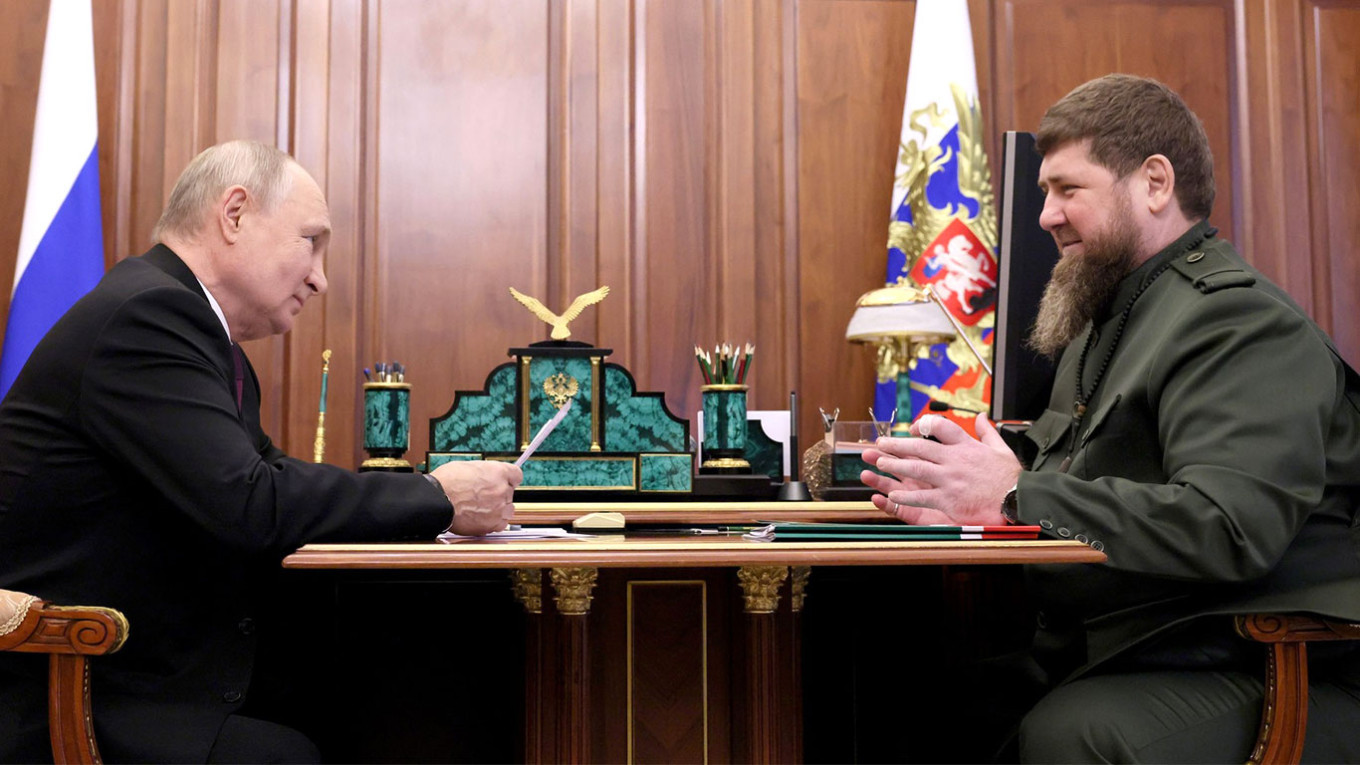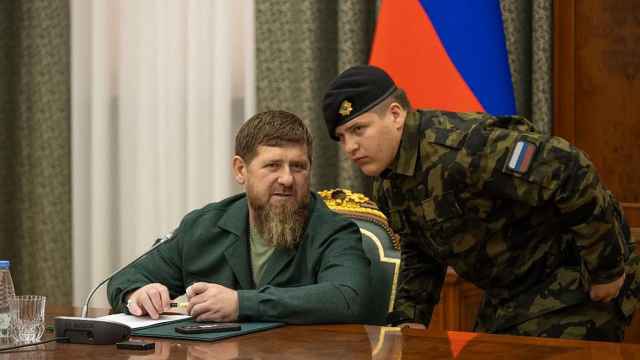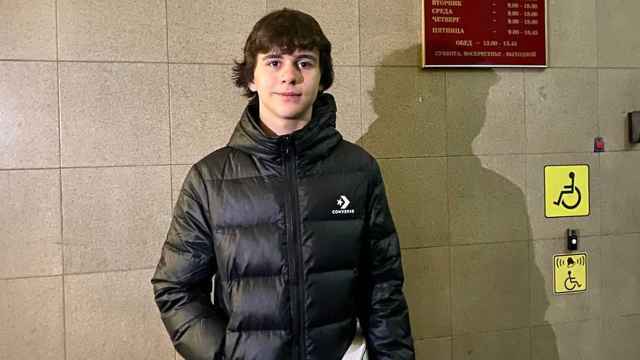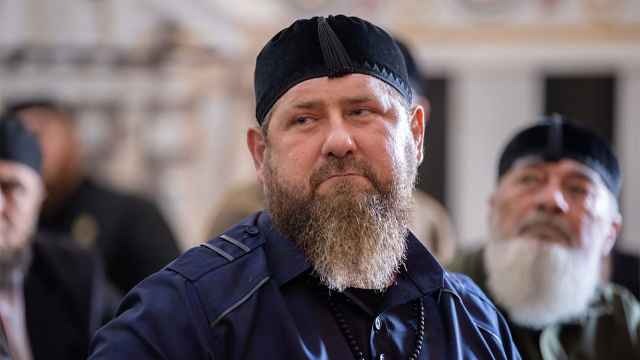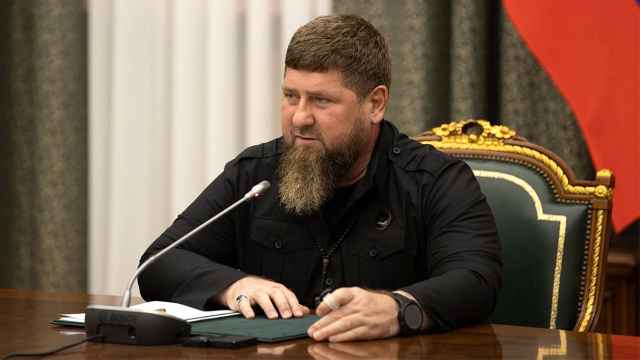Independent news outlet Novaya Gazeta Europe reported on Monday that Ramzan Kadyrov, the strongman leader of Chechnya, has been living with a potentially fatal illness for more than five years, prompting the Kremlin to start working on a plan for a managed transfer of power.
In the first part of its investigation into the political landscape in the North Caucasus republic, Novaya Gazeta Europe detailed 47-year-old Kadyrov’s many hospitalizations for his alleged pancreatic necrosis and how both his and the Kremlin’s PR teams have tried to conceal the Chechen leader’s rapidly deteriorating condition.
The outlet also named Major General Apti Alaudinov, the commander of Kadyrov’s own Akhmat military unit fighting on the frontlines in Ukraine, as the successor favored by the Kremlin.
To make sense of the bombshell investigation spotlighting one of Russia’s most volatile regions, The Moscow Times asked leading experts and activists for their first impressions and predictions for Chechnya’s future after Kadyrov.
Tanya Lokshina, associate director of Human Rights Watch's Europe and Central Asia division
“I have the utmost respect for colleagues at Novaya Gazeta who have been looking at Chechnya with full professional dedication for many years and who are really quite knowledgeable as far as Chechnya is concerned. At the same time…Kadyrov is very far from dead yet,” Lokshina told The Moscow Times.
“I think what's important right now is that Kadyrov's position in Chechnya is very strong. And it's not about Kadyrov alone as a single-handed dictator…If he dies or if his health deteriorates and he won't be able to continue with carrying out his duties, there are quite a few people behind him who would be continuing in the same vein,” said Lokshina.
“The type of abuses that we've been documenting in Chechnya for many years, abuses perpetrated with complete impunity, the absolute lack of freedom that contemporary Chechnya is infamous for, are not going to disappear if Kadyrov disappears."
Abubakar Yangulbaev, Chechen human rights lawyer and activist
“Chechen activists, opposition figures and dissidents have been discussing Apti Alaudinov’s behavior, ambitions of [the chair of the Chechen parliament] Magomed Daudov, as well as Kadyrov’s children…and his health for at least the past year,” Yangulbaev told The Moscow Times. “So nothing in this investigation surprised me.”
Yangulbaev said he believes Alaudinov, who was singled out in the investigation, is just one of several potential successors of Kadyrov who, if chosen, would merely keep the seat warm until Kadyrov’s eldest son — now 18 — comes of age to succeed him.
Alaudinov’s role would resemble that of second Chechen president Alu Alkhanov, who served as a placeholder for Ramzan Kadyrov after his father Akhmad Kadyrov was assassinated in 2004, according to Yangulbaev.
“Alaudinov will be like that. He can only temporarily guard the seat [for Kadyrov’s son] because he has no authority in the eyes of the Chechen people and especially in the eyes of Kadyrovites, who are trained like service dogs,” said Yangulbaev.
“Intuitively, right now I don’t really expect any changes,” Yangulbaev said when asked whether Kadyrov’s sudden death could plunge Chechnya into turmoil. “But these things usually happen unpredictably and unexpectedly.”
Harold Chambers, an analyst focusing on nationalism, conflict and security in the North Caucasus
“The assessment of Alaudinov’s viability I found not plausible, as it was detached from his own history, Kadyrov regime internal dynamics, Kadyrov regime domestic politics, and the regime’s relationship with Moscow,” Chambers said of Novaya Gazeta Europe’s investigation. “They considered Chechnya as just another federal subject, rather than the Kadyrov family’s personal fiefdom, with internal formal and informal structures developed accordingly.”
Chambers said he believes that Chechnya is unlikely to descend into chaos unless there is a regime change in the Kremlin before Kadyrov leaves power.
“I expect a projection of stability regardless of how succession is handled. Beneath the façade of propaganda, however, there will surely be in-fighting over division of responsibilities and power, unless one of the Kadyrov sons is ready to take over the role of governor,” he told The Moscow Times.
“Regardless, Kadyrov’s death would certainly create a perceived window of opportunity for resumed larger-scale conflict, meaning an uptick in militant activity would likely occur. I say ‘perceived’ because there is a chance the chain of command remains continuous — I suspect this matter is already somewhat settled, and likely has been for a while.”
Ivan U. Kłyszcz, a researcher of Russian policy at the International Center for Defense and Security in Tallinn, Estonia
“I'm conflicted about this story [published by Novaya Gazeta Europe],” Kłyszcz told The Moscow Times.
“On the one hand, the story does bring together many points that we have noticed before, which have been picked up by [other] media and analysts. I trust Novaya Gazeta…but this is also the type of story that could be manipulated for purposes of disinformation. They've promised that there would be more reports, so I'm holding my judgment until new evidence is presented.”
Kłyszcz said he was not “persuaded” that the Akhmat unit’s Apti Alaudinov could be Kadyrov’s potential successor.
“Based on how Kadyrov got his position in the first place — that it was kind of a dynastic succession — I strongly believe that the successor would be if not Kadyrov’s child, then at least someone who is incredibly close to him,” said Kłyszcz.
“These types of precedents are very important. They do shape the way actors think about how succession might be done. Of course, that doesn't preclude the possibility of other paths and other outcomes.”
A Message from The Moscow Times:
Dear readers,
We are facing unprecedented challenges. Russia's Prosecutor General's Office has designated The Moscow Times as an "undesirable" organization, criminalizing our work and putting our staff at risk of prosecution. This follows our earlier unjust labeling as a "foreign agent."
These actions are direct attempts to silence independent journalism in Russia. The authorities claim our work "discredits the decisions of the Russian leadership." We see things differently: we strive to provide accurate, unbiased reporting on Russia.
We, the journalists of The Moscow Times, refuse to be silenced. But to continue our work, we need your help.
Your support, no matter how small, makes a world of difference. If you can, please support us monthly starting from just $2. It's quick to set up, and every contribution makes a significant impact.
By supporting The Moscow Times, you're defending open, independent journalism in the face of repression. Thank you for standing with us.
Remind me later.



